#serp features
Explore tagged Tumblr posts
Text
"Mangools Reviews: Unleashing the Power of SEO Tools"
Mangools is a powerful SEO suite that has been gaining popularity among digital marketers and website owners. In this article, we will provide a comprehensive review of Mangools and its various features, as well as offer insights into its pros and cons.
Mangools is an all-in-one SEO tool that comprises five modules: KWFinder, SERPChecker, SERPWatcher, LinkMiner, and SiteProfiler. Each module provides a unique set of features that help website owners and digital marketers improve their website's search engine rankings, analyze their competition, and optimize their backlink profile.
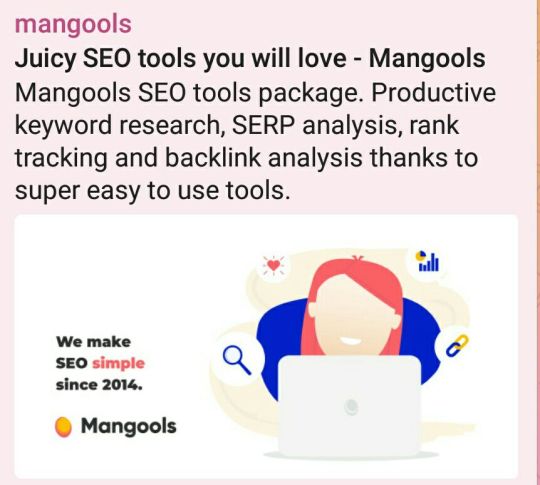
With KWFinder, users can find long-tail keywords with low competition and high search volume that can help improve their website's rankings. The SERPChecker module provides insights into the search engine results pages (SERPs) and the organic results of their competitors. SERPWatcher helps track keyword rankings, and LinkMiner helps analyze the backlink profile of any website. Finally, SiteProfiler provides a comprehensive overview of any website, including its backlink profile, organic search traffic, and top-performing pages.
Mangools is an affordable SEO suite that provides an intuitive user interface and a vast array of features that can help website owners and digital marketers of all levels. Its pricing plans start at just $29.90 per month, making it an excellent option for small businesses and startups that want to improve their website's SEO without breaking the bank.
However, one of the drawbacks of Mangools is that some of its modules, such as SERPChecker and SERPWatcher, do not provide as much data as some of the more established SEO tools like Ahrefs and SEMrush. Additionally, Mangools does not provide features such as content analysis or social media tracking, which may be essential for some digital marketers.
Overall, Mangools is an excellent option for website owners and digital marketers looking for an affordable and easy-to-use SEO suite. Its five modules provide a wide array of features that can help improve a website's search engine rankings, analyze competitors, and optimize their backlink profile. However, for more established businesses with larger budgets, it may be worth considering some of the more comprehensive SEO tools available on the market.
Frequently Asked Questions (FAQs)
What is Mangools? Mangools is an all-in-one SEO suite that comprises five modules: KWFinder, SERPChecker, SERPWatcher, LinkMiner, and SiteProfiler.
What features does Mangools offer? Mangools provides features such as keyword research, SERP analysis, backlink analysis, and website analysis.
How much does Mangools cost? Mangools' pricing plans start at just $29.90 per month.
Is Mangools easy to use? Yes, Mangools provides an intuitive user interface that makes it easy for website owners and digital marketers of all levels to use.
Does Mangools provide as much data as other established SEO tools? Some of Mangools' modules, such as SERPChecker and SERPWatcher, do not provide as much data as some of the more established SEO tools like Ahrefs and SEMrush.
Click Here More information
#Mangools#SEO#keyword research#SERP analysis#backlink analysis#rank tracking#competitor analysis#SEO software#keyword difficulty#search volume#keyword suggestion#SEO metrics#SEO toolset#keyword explorer#SERP features#link miner#site profiler#SEO audit#SEO reports#SEO analysis#keyword rank#keyword tracking#SEO strategies#SEO optimization#SEO insights
4 notes
·
View notes
Link
Ensure that your website's on-page elements are optimized, including title tags, meta descriptions, header tags (H1, H2, etc.), and image alt tags. These elements should contain relevant keywords and accurately describe the content of each page.
#schema markup#seo strategies#on-page optimization#structured data#search engine ranking#SEO tips#rich snippets#serp features#website optimization#JSON-LD#microdata#rdfa#content visibility#search engine results#seo best practices
0 notes
Text
Zero-Click Searches: How to Adapt Your SEO Strategy for Google’s Changing SERPs

In the ever-evolving world of SEO, zero-click searches have emerged as a game-changer for businesses aiming to gain visibility on Google's search engine results pages (SERPs). These searches occur when users find the information they need directly on the SERP without having to click on a website. With features like Featured Snippets, Knowledge Panels, People Also Ask boxes, and Local Packs, more queries are answered on Google’s page, meaning fewer click-throughs to websites.
At SV Soft Solutions, we specialize in helping businesses optimize their SEO strategies for the changing digital landscape. As zero-click searches rise, it’s critical to focus on SERP visibility instead of merely aiming for clicks. In this post, we’ll explain what zero-click searches are, how they impact your SEO efforts, and how your business can adapt to benefit from this growing trend.
What Are Zero-Click Searches?
A zero-click search happens when Google provides users with the information they’re looking for directly in the SERP. This eliminates the need for users to visit a website to get their answers. Some of the key features contributing to zero-click searches include:
Featured Snippets: A highlighted box at the top of the SERP that answers user queries.
Knowledge Panels: Information-rich boxes that appear on the right side of the SERP, often for well-known people, brands, or locations.
People Also Ask: A dropdown list of related questions, offering users multiple answers.
Local Packs: Local business listings linked with Google Maps, providing information without requiring users to click through.
These features are designed to offer fast answers, reducing the need for users to leave the search results page. For businesses, this means fewer users clicking through to their websites, making zero-click searches a double-edged sword.
Impact of Zero-Click Searches on SEO
For brands, the rise of zero-click searches presents both challenges and opportunities. Traditional SEO strategies focused on driving clicks to a website, but with more users finding answers directly in the SERP, the focus is shifting towards getting your content featured within these zero-click features.
Key ways zero-click searches are changing SEO:
Lower Organic CTR: Fewer users are clicking on organic search results as they get answers directly on the SERP.
Increased Importance of SERP Features: Getting featured in Featured Snippets, Knowledge Panels, or Local Packs is now critical for visibility.
Local SEO Becomes Essential: For local businesses, appearing in Google Maps and Local Packs is crucial for driving customers.
Despite fewer clicks, adapting your SEO strategy for zero-click opportunities can keep your business in front of users in the right moments.
How to Adapt Your SEO Strategy for Zero-Click Searches
To succeed in the era of zero-click searches, businesses need to shift their SEO strategies towards targeting SERP features rather than focusing solely on rankings and clicks. At SV Soft Solutions, we recommend the following approaches to remain competitive in the search landscape.
1. Optimize for Featured Snippets
Featured Snippets are one of the most powerful opportunities for gaining visibility in zero-click searches. These snippets provide users with a direct answer to their query and appear above the traditional search results.
How to Optimize:
Write clear, concise answers to common questions.
Structure your content in ways that Google favors, such as numbered lists, bullet points, or short paragraphs.
Target long-tail keywords that users are likely to ask in question format (e.g., "How to..." or "What is...").
By appearing in Featured Snippets, your business can claim valuable space at the top of the SERP, even if users don’t click through.
2. Leverage ‘People Also Ask’ Boxes
The People Also Ask (PAA) feature gives users related questions and answers to their original search query. Ranking within these boxes offers another chance for your content to be visible in zero-click results.
How to Optimize:
Identify common user queries related to your business through tools like Google Search Console and Answer the Public.
Incorporate FAQs into your website content, focusing on answering relevant questions in a clear and direct manner.
Structure your answers similarly to how Google formats PAA responses—brief and to the point.
Appearing in the People Also Ask section can increase your brand’s visibility across multiple queries without requiring users to click through.
3. Prioritize Local SEO for Google Maps and Local Packs
For businesses with a physical location, optimizing for local searches is crucial in the zero-click era. Google Maps and Local Packs often provide users with all the information they need without ever clicking on a website.
How to Optimize:
Fully optimize your Google My Business profile with accurate business information.
Regularly collect positive reviews from satisfied customers to improve your ranking in local search results.
Ensure consistent NAP (Name, Address, Phone Number) information across all digital platforms.
Appearing in Local Packs and Google Maps helps drive foot traffic to your business, even without website visits.
4. Target Search Intent with Structured Content
As Google continues to improve its understanding of search intent, your content should align with what users are looking for—whether it’s informational, navigational, or transactional queries.
How to Optimize:
Research user intent behind keywords using tools like Ahrefs or SEMrush.
Create content that addresses user needs, such as blog posts for informational searches or product pages for transactional searches.
Use clear headers, subheadings, and structured data (schema markup) to make your content easier for search engines to understand.
Structuring your content based on search intent increases the likelihood of being featured in zero-click SERP features.
5. Build Your Brand’s Knowledge Graph
Knowledge Panels are another key area in zero-click searches. Optimizing for Google’s Knowledge Graph can help your business appear in these panels, offering key details to users without requiring a click.
How to Optimize:
Ensure your business is listed in reputable directories like Google My Business, Wikipedia, and Wikidata.
Implement structured data on your website using schema markup to provide Google with detailed information about your brand.
Build your online presence through social media and reputable backlinks.
By appearing in Knowledge Panels, your business can gain authority and instant recognition on the SERP.
Conclusion: Embrace the Future of SEO with Zero-Click Searches
As the digital landscape continues to evolve, the rise of zero-click searches means businesses must adapt their SEO strategies to stay visible. By focusing on optimizing for SERP features like Featured Snippets, People Also Ask boxes, and Local Packs, your brand can capture the attention of users directly on the search results page.
At SV Soft Solutions, we help businesses navigate these SEO changes and implement strategies that drive success in this new era of search. Ready to adapt your SEO for zero-click searches? Contact us today and let’s help your business stay ahead of the curve!
For more details
📞 Contact us today at +91 81211 15678
https://svss.co.in/zero-click-searches-how-to-adapt-your-seo-strategy-for-googles-changing-serps/
#Zero-Click Searches#SEO Strategy#Featured Snippets#Google SERP#Local SEO#Knowledge Panels#People Also Ask#Digital Marketing#SV Soft Solutions
0 notes
Text
Unlocking the Power of SEO - Boost Your Online Presence | HugeCount
In today’s digital age, having a strong online presence is crucial for businesses to succeed. One of the most effective ways to improve your online visibility and attract more organic traffic to your website is through search engine optimization (SEO). SEO is the process of optimizing your website and its content to rank higher in search engine results pages (SERPs) for relevant keywords. In this article, we will explore the basics of SEO and why it is important for businesses. Understanding the Basics of SEO: What Every Business Owner Should Know SEO, or search engine optimization, is the practice of […]
Source: https://hugecount.com/tech/unlocking-the-power-of-seo-boost-your-online-presence/
#featured posts#Off-Page Optimization#On-Page Optimization#Search Engine Optimization#SEO#SEO strategy#SERPs#Tech
0 notes
Text
youtube
0 notes
Text
Unlocking Success: Strategies for Winning Google SERP Features
In the world of online search, Google dominates as the leading search engine. As businesses strive to enhance their online visibility and attract more organic traffic, it's essential to understand and strategize for Google's SERP (Search Engine Results Page) features. These features go beyond traditional organic search results and can significantly impact a website's visibility and click-through rates. In this article, we will explore the concept of Google SERP features, highlight their importance, and provide strategies for winning them.
Understanding Google SERP Features: Google SERP features are specialized elements that appear within the search results, providing users with additional information and options beyond the standard organic listings. These features can include featured snippets, knowledge panels, local packs, image carousels, videos, and more. Google utilizes these features to deliver more relevant and diverse search results, enhancing the user experience by presenting information in various formats.
Importance of Winning Google SERP Features:
Increased Visibility and Click-Through Rates: Securing a Google SERP feature can significantly increase a website's visibility on the search engine results page. Featured snippets, for example, are positioned at the top of the organic results, making them highly visible to users. By winning these features, businesses can attract more attention, gain credibility, and ultimately increase click-through rates to their websites.
Enhanced User Experience: Google SERP features are designed to enhance the user experience by providing quick and concise answers to users' queries. By winning these features, businesses can provide valuable information directly within the search results, establishing themselves as reliable sources of knowledge. This improves user satisfaction and encourages users to engage further with the brand.
Authority and Credibility: Securing a Google SERP feature, such as a knowledge panel or a featured snippet, can significantly boost a business's authority and credibility in its niche. These features showcase expertise, industry recognition, and brand prominence. By positioning themselves as thought leaders in their field, businesses can gain trust from their target audience, leading to increased brand loyalty and customer acquisition.
Strategies for Winning Google SERP Features:
Identify and Target Relevant SERP Features: Conduct thorough keyword research to identify the SERP features that are most relevant to your industry and target audience. Study the types of features that appear for specific queries and assess the competition. Focus on the features that align with your business goals and have a higher chance of driving meaningful traffic and engagement.
Optimize Content for Featured Snippets: Featured snippets are concise summaries that appear at the top of the search results. To optimize for featured snippets, create well-structured content that answers specific questions or provides valuable information. Use headings, bullet points, and tables to make your content more scannable and easily extractable by search engines.
Leverage Structured Data: Implement structured data markup, such as Schema.org, on your website. Structured data helps search engines understand the content and context of your web pages. By marking up your content, you increase the chances of your website appearing in knowledge panels, rich snippets, and other relevant SERP features.
Focus on Local SEO: For businesses with a physical presence, optimizing for local SEO is crucial. This involves optimizing your Google My Business listing, acquiring positive reviews, and ensuring consistent NAP (Name, Address, Phone) information across various online directories. These efforts increase the likelihood of your business appearing in local packs, map results, and other location-based SERP features.
Create Engaging Multimedia Content: Google increasingly emphasizes visual content, such as images and videos, in the search results. Incorporate relevant images, infographics, and videos into your content strategy. Optimize them with descriptive titles, alt tags, and relevant metadata toensure they are discoverable and stand a better chance of appearing in image carousels, video carousels, and other multimedia SERP features.
Provide High-Quality and Authoritative Content: Consistently produce high-quality, informative, and engaging content that establishes your expertise and authority in your industry. Conduct thorough research, cite credible sources, and aim to provide comprehensive answers to users' queries. Search engines prioritize content that demonstrates expertise, so focus on creating valuable resources that users find helpful and shareable.
Conclusion: Winning Google SERP features is an essential aspect of any comprehensive SEO strategy. By understanding the importance of these features and implementing effective strategies, businesses can increase their visibility, enhance the user experience, and establish authority and credibility in their respective industries. Through targeted optimization, structured data implementation, local SEO efforts, multimedia content creation, and the delivery of high-quality content, businesses can unlock success by winning Google SERP features and attracting valuable organic traffic to their websites.
0 notes
Text
Exploring Search Results as Word Clouds: CloudSERP Explorer
In my endless quest to find ways for users to create more detailed search queries without having lots of foreknowledge… I made a Gizmo, CloudSERP Explorer, that queries WordPress, Bing, and Bing News, then shows the titles of the results as a word cloud (one cloud per query.) Clicking on a word takes you to a search of the cloud’s word-source using both the original query and the word you clicked…

View On WordPress
0 notes
Text



Prompts used: • Explore how different cultures have different ways of experiencing seasons or have different names for them. • Calendars and timekeeping @yourcubitoyourculture
This is part the last part dedicated to Ukrainian names of the months. Check out other parts in the links below!!
Featuring Ren, Mumbo and Pearl!
autumn || winter || spring || summer
_______________________________
"Червень" (cherven') - June “Червець”(chervets') - cochineal, is a name of a bug that is active during this period, and was used to make red dye. Previously, the month shared the same name with the bug.
"Липень"(lypen') - July “Липа”(lypa) - linden, this name is associated with the flowering of linden trees and the period of collecting linden honey.
"Серпень" (serpen') - August “Серп”(serp) - sickle. This month marks the start of grain harvest in Ukraine. Sickle is the most known tool used in this process.
#nuno draws#your cubito your culture 2024#your cubito your culture#hermitcraft#hermitcraft fanart#rendog fanart#rendog#mumbo fanart#mumbo jumbo#mumbo#mumbo jumbo fanart#pearl hermitcraft#pearlecentmoon fanart#pearlescentmoon fanart#pearlescentmoon#укртамблер#укртумбочка#украрт#український тамблер#український tumblr
166 notes
·
View notes
Text
The cache feature historically let you view a webpage as Google sees it, which is useful for a variety of different reasons beyond just being able to see a page that’s struggling to load. SEO professionals could use it to debug their sites or even keep tabs on competitors, and it can also be an enormously helpful news gathering tool, giving reporters the ability to see exactly what information a company has added (or removed) from a website, and a way to see details that people or companies might be trying to scrub from the web. Or, if a site is blocked in your region, Google’s cache can work as a great alternative to a VPN.
As the Google cache feature is being taken away, I'd recommend using the Wayback Machine, Cached Pages, or archive.today to find cached links of webpages, especially if you want to get past firewalls.
723 notes
·
View notes
Text
Paradise Lost: How John Milton's 1667 work influenced "Hazbin Hotel"
I've been thinking about why the "fruit of knowledge" in Hazbin Hotel is depicted as an apple, as opposed to another fruit that would've been more accurate to the Middle East during the Fall of Man, as well as how Paradise Lost by John Milton (1667) influenced the show.
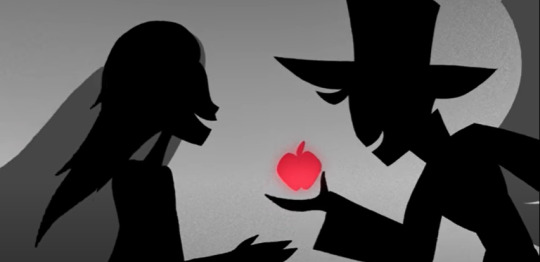
Per one source:
"Because the Hebrew Bible describes the forbidden fruit only as 'peri', the term for general fruit, no one knows [what exactly type of fruit it was]. It could be a fruit that doesn't exist anymore. Historians have speculated it may have been any one of these fruits: pomegranate, mango, fig, grapes, etrog or citron, carob, pear, quince, or mushroom."
Per Wikipedia:
"The pseudepigraphic Book of Enoch describes the tree of knowledge: 'It was like a species of the Tamarind tree, bearing fruit which resembled grapes extremely fine; and its fragrance extended to a considerable distance. I exclaimed, How beautiful is this tree, and how delightful is its appearance!' (1 Enoch 31:4)."
In Jewish and Islamic traditions, the "fruit of knowledge" is commonly identified with grapes. The Zohar explains that Noah attempted (but failed) to rectify the sin of Adam by using grape wine for holy purposes. Today, the "Noah grape" is still used to make white wine.

Furthermore:
"The association of the pomegranate with knowledge of the underworld as provided in the Ancient Greek legend of Hades and Persephone may also have given rise to an association with knowledge of the 'otherworld', tying-in with knowledge that is forbidden to mortals. It is also believed Hades offered Persephone a pomegranate to force her to stay with him in the underworld for 6 months of the year. Hades is the Greek god of the underworld, and the Bible states that whoever eats the forbidden fruit shall die."

So, how then did the apple become the foremost symbol of the "fruit of knowledge"? You can partly thank Paradise Lost by English poet John Milton, a work which the lore of Hazbin Hotel is based off of.
Milton published the book in 1667, a time when the hedonistic Restoration era was in full swing. The exiled King Charles II was restored to the throne as King of England in 1660, and was a party animal, with dozens of mistresses, and nicknamed both the "playboy prince" and "Old Rowley", the latter after his favorite lustful stallion.
However, the association of the "fruit of knowledge" began with a Latin pun long before Milton immortalized the association in Paradise Lost. Per the linked article above by Nina Martyris for NPR:
"In order to explain, we have to go all the way back to the fourth century A.D., when Pope Damasus ordered his leading scholar of scripture, Jerome, to translate the Hebrew Bible into Latin. Jerome's path-breaking, 15-year project, which resulted in the canonical 'Vulgate', used the Latin spoken by the common man. As it turned out, the Latin words for evil and apple are the same: 'malus'.
[...] When Jerome was translating the 'Tree of the Knowledge of Good and Evil', the word 'malus' snaked in. A brilliant but controversial theologian, Jerome was known for his hot temper, but he obviously also had a rather cool sense of humor.
'Jerome had several options,' says Robert Appelbaum, a professor of English literature at Sweden's Uppsala University. 'But he hit upon the idea of translating 'peri' as 'malus', which in Latin has two very different meanings. As an adjective, 'malus' means 'bad' or 'evil'. As a noun it seems to mean an apple, in our own sense of the word, coming from the very common tree now known officially as the 'Malus pumila'. So Jerome came up with a very good pun.'
The story doesn't end there. 'To complicate things even more,' says Appelbaum, 'the word 'malus' in Jerome's time, and for a long time after, could refer to any fleshy seed-bearing fruit. A pear was a kind of 'malus'. So was the fig, the peach, and so forth.'
Which explains why Michelangelo's Sistine Chapel fresco features a serpent coiled around a fig tree. But the apple began to dominate Fall artworks in Europe after the German artist Albrecht Dürer's famous 1504 engraving depicted the First Couple counterpoised beside an apple tree. It became a template for future artists such as Lucas Cranach the Elder, whose luminous Adam and Eve painting is hung with apples that glow like rubies.
Milton, then, was only following cultural tradition. But he was a renowned Cambridge intellectual fluent in Latin, Greek and Hebrew, who served as secretary for foreign tongues to Oliver Cromwell during the Commonwealth. If anyone was aware of the 'malus' pun, it would be him, and yet he chose to run it with it. Why?
Appelbaum says that Milton's use of the term 'apple' was ambiguous. 'Even in Milton's time the word had two meanings: either what was our common apple, or, again, any fleshy seed-bearing fruit. Milton probably had in mind an ambiguously named object with a variety of connotations as well as denotations, most but not all of them associating the idea of the apple with a kind of innocence, though also with a kind of intoxication, since hard apple cider was a common English drink.'
It was only later readers of Milton, says Appelbaum, who thought of 'apple' as 'apple', and not any seed-bearing fruit. For them, the forbidden fruit became synonymous with the 'malus pumila'. As a widely read canonical work, 'Paradise Lost' was influential in cementing the role of apple in the Fall of Man story."
To tie this back into John Milton's relationship with King Charles II of England, as mentioned, Milton originally served Oliver Cromwell, Lord Protector of England, and the English Commonwealth, which was formed with the overthrow and execution of King Charles I on 30 January 1649, following the bloody English Civil War (1642 – 1651).
The King's two sons - the newly-christened King Charles II, the elder, and James, Duke of York (King James II), the younger - fled into exile on the European continent. However, with the death of Oliver Cromwell on 3 September 1658 came the 2-year-long dissolution of the English Commonwealth, and the restoration of the monarchy.
As for Milton himself, we can look to an article by Bill Potter.
Milton, born on 9 December 1608, was around 51-52 years old when King Charles II was restored to the throne. He attended Christ's Church, Cambridge in his youth, and mastered at least six languages, as well as history and philosophy; making him, perhaps, the most knowledgeable poet in history. He spent more than a year travelling across Europe, conversing with and learning from intellectuals, linguists, poets, and artists, including the famous Galileo Galilei.
However, Milton was a controversial figure of his time, being unafraid to criticize institutions of authority; arguing that "divorce was Biblical", for which he was routinely condemned; joining the Puritans; penning the Areopagitica, a treatise on liberty in favor of Parliament and the Roundhead rebels, during the reign of King Charles I, arguing that the King must be held accountable by the people; and agreed with and justified the murder of King Charles I, for which Parliament hired him in 1649 as a propagandist and correspondence secretary to foreign powers, on account of his fiery manifestos against "the man".
The collapse of the Commonwealth with the death of Oliver Cromwell in 1658 did not deter Milton from continued political writing against the monarchy and the new public sentiment that brought about its Restoration under King Charles II in 1660. On the contrary, Milton - now totally blind, having lost his eyesight by the age of 44 in 1652, a decade earlier - began writing Paradise Lost in 1661, and spent the next six years dictating the work to transcribers.
A supporter of regicide, Milton was also forced into exile himself, and faked his own death, as Charles refused to pardon - and sought to execute - any of those directly involved with his father's murder. Milton's friends held a mock funeral for Milton on 27 August 1660, just months after the coronation of King Charles II on 23 April 1660.
King Charles II commented that he "applauded his [Milton's] policy in escaping the punishment of death [execution for treason] by a reasonable show of dying", but insisted on a public spectacle nonetheless by having Milton's writings burned by the public hangman.
After eventually obtaining a general pardon from King Charles II, Milton was imprisoned, and released, likely due to political friends in high places. He died, aged 64, in 1674. His theological views were sometimes considered heterodox by the best Puritans, and his political views came close to getting him executed on several occasions. His poetry, however, has endured as some of the greatest works in the English language, especially Paradise Lost; much of his greatest work was written during his 22 years of complete blindness.
One of the main factors in King Charles II deciding to grant a pardon to Milton was, ironically, Paradise Lost. While originally written by Milton as a scathing criticism of King Charles II and the monarchy - depicting Lucifer Morningstar as a sympathetic rebel against God, with King Charles II claiming that is right to rule came from "divine ordainment" - Charles II enjoyed the work, and authorized its publication on 20 August 1667. We know this because a 1668 copy of Paradise Lost in royal bindings by Samuel Mearne, bound lovingly in a fine red leather made of goat skins tanned with sumac, and stamped in gold with the royal cypher of King Charles II, was found. The endpapers bore a watermark with the royal arms of Charles II.

Per one Miltonian scholar: "The most single important event in Milton's life was the event against which he struggled most: the Restoration of Charles II, [and his relationship with the King]. Had it not come, we might have never had Paradise Lost...certainly, we should never have had [it] in [its] present power and significance."
Milton followed up Paradise Lost with Paradise Regained in 1671, three years before his death, with advice for King Charles II, urging the hedonistic Charles to "reign over himself and his passions":
"For therein stands the office of a King, His Honour, Vertue, Merit and chief Praise, That for the Publick all this weight he bears. Yet he who reigns within himself, and rules Passions, Desires, and Fears, is more a King; Which every wise and vertuous man attains: And who attains not, ill aspires to rule Cities of men, or head-strong Multitudes, Subject himself to Anarchy within, Or lawless passions in him which he serves." - John Milton, Paradise Regained, Book II, lines 463-472
To summarize: "If we must have a King back again, my Lord, please try to be a good man, unlike your father, who fell to his pride, [which was also the downfall of Lucifer]."
To quote another source: "Though the passage begins by noting that the office of a King is to bear the weight of public concerns, it is the control of one's private concerns that truly set a King apart as a virtuous character. Indeed, so important is self-command that any wise or virtuous man who attains it is like a king; any king who does not practice [self-command] is nothing more than a mere subject, ruled by anarchy and lawlessness."
Milton's words, too, echo a work written by Charles' grandfather, King James VI/I of Scotland and England: Basilikon Doron ("Royal Gift").
Per Wikipedia:
"'Basilikon Doron' (Βασιλικὸν Δῶρον) means 'royal gift' in Ancient Greek, and was written in the form of a private letter to James' eldest son, Henry, Duke of Rothesay (1594–1612). After Henry's death, James gave it to his second son, Charles, born 1600, later King Charles I. Seven copies were printed in Edinburgh in 1599, and it was republished in London in 1603, when it sold in the thousands.
This document is separated into three books, serving as general guidelines to follow to be an efficient monarch. The first describes a king's duty towards God as a Christian. The second focuses on the roles and responsibilities in office. The third concerns proper behaviour in daily life.
As the first part is concerned with being a good Christian, James instructed his son to love and respect God as well as to fear Him. Furthermore, it is essential to carefully study the Scripture (the Bible) and especially specific books in both the Old and New Testaments. Lastly, he must pray often and always be thankful for what God has given him.
In the second book, James encouraged his son to be a good king, as opposed to a tyrant, by establishing and executing laws as well as governing with justice and equality, such as by boosting the economy. The final portion of the Basilikon Doron focuses on the daily life of a monarch.
All of these guidelines composed an underlying code of conduct to be followed by all monarchs and heads of state to rule and govern efficiently. James assembled these directions as a result of his own experience and upbringing. He, therefore, offered the 'Basilikon Doron' ('Royal Gift') to his son, with the hope of rendering him a capable ruler, and perhaps to pass it down to future generations.
Overall, it repeats the argument for the divine right of kings, as set out in 'The True Law of Free Monarchies', which was also written by James. It warns against 'Papists' (Roman Catholics) and derides Puritans, in keeping with his philosophy of following a 'middle path', which is also reflected in the preface to the 1611 King James Bible. It also advocates removing the Apocrypha from the Bible."
King James VI/I further instructed his son and grandson:
"A good monarch must be well acquainted with his subjects, and so it would be wise to visit each of the kingdoms every three years."
"During war or armed conflict, he should choose old-but-good captains to lead an army of young and agile soldiers."
"In the court and the household, [a royal] should carefully select loyal gentlemen and servants to surround him. When the time came to choose a wife, it would be best if she were of the same religion and had a generous estate. However, she must not meddle with governmental politics, but perform her domestic duties."
"As for inheritance, to ensure stability, the kingdom should be left to the eldest son, not divided among all children."
"Lastly, it is most important...that [a royal] would know well his own craft...to properly govern over his subjects. To do so, [one] must study the laws of the kingdom, and actively participate in the council. Furthermore, [one] must be acquainted with mathematics for military purposes, and world history for foreign policy."
"[A royal] must also not drink and sleep excessively. His wardrobe should always be clean and proper, and he must never let his hair and nails grow long. In his writing and speech, he should use honest and plain language."
King James VI/I further supplemented Basilikon Doron with a written treatise titled The True Law of Free Monarchies: Or, The Reciprocal and Mutual Duty Between a Free King and His Natural Subjects.
"It is believed King James VI/I wrote the tract to set forth his idea of absolutist monarchism in clear contrast to the contractarian views espoused by, among others, James' tutor George Buchanan (in 'De Jure Regni apud Scotos'), [which] held the idea that monarchs rule in accordance of some sort of social contract with their people. James saw the divine right of kings as an extension of the apostolic succession, as both not being subjected by humanly laws."
Milton's own Areopagitica was a follow-up on De Jure Regni apid Scotos by George Buchanan, and also to The True Law of Free Monarchies, as well as the idea of the "divine right of kings". It takes its title in part from Areopagitikos (Greek: Ἀρεοπαγιτικός), a speech written by Athenian orator Isocrates in the 4th century BC.
Most importantly, Milton also wrote on the concept of free will: "Milton's ideas were ahead of his time in the sense that he anticipated the arguments of later advocates of freedom of the press by relating the concept of free will, and choice to individual expression and right."
The concept of free will, too, was a major topic explored in Paradise Lost. Per one source: "In 'Paradise Lost', Milton argues that though God foresaw the Fall of Man, he still didn't influence Adam and Eve's free will. [...] God specifically says that he gives his creatures the option to serve or disobey, as he wants obedience that is freely given [or chosen], not forced. Some critics have claimed that the God of the poem undercuts his own arguments; however, Milton did not believe in the Calvinistic idea of 'predestination' (that God has already decided who is going to Hell and who to Heaven), but he often comes close to describing a Calvinistic God. God purposefully lets Lucifer (Satan) escape Hell, and sneak past Uriel into the Garden of Eden, and basically orchestrates the whole situation so that humanity can be easily ruined by a single disobedient act. In describing the Fall of Man before it happens, God already predicts how he will remedy it, and give greater glory to himself by sending his Son [Jesus Christ] to die, and restore the order of Heaven."
In Hazbin Hotel, Adam also describes the Calvinistic idea of 'predestination', and that "the rules are black and white":

However, "This possible predestination leads to the theory of the 'fortunate fall', which is based on Adam's delight at learning of the eventual coming of the Messiah [from his bloodline]. This idea says that God allowed the Fall of Man, so that he could bring good out of it, possibly more good than would have occurred without the Fall, and be able to show his love and power through the incarnation of his Son. In this way, the free will of Adam and Eve (and Lucifer/Satan) remains basically free, but still fits into God's overarching plan."
However, there is one major flaw with this, and that is that we don't know if Jesus Christ exists within the Hazbin Hotel universe or not. Yet Charlie Morningstar, the daughter of Lucifer Morningstar and Lilith, and the "Princess of Hell", is depicted as a savior-esque figure within the show who, like God in Paradise Lost, encourages lowly sinners to choose obedience to God out of their own free will. More interestingly, Charlie does not come from Adam's bloodline; yet, while Lucifer decries 'free will', Charlie supports 'free will' instead.
Perhaps is is merely because Charlie, being the daughter of Lucifer and Lilith, claims to want to fulfill Lilith's "dream" of humanity being empowered in Hell ("The mind is its own place, it can make Heaven out of Hell, or Hell out of Heaven" - Lucifer, Paradise Lost); however, I think it also stems from Charlie having a genuine belief that 'free will', and people choosing to do good instead of evil, is "good" and "Godly".
True to Paradise Lost, this is also in fulfillment of God's plan; and, according to one fanfiction, why God allowed Charlie to be born to Lucifer and Lilith, so that sinners may be redeemed through Charlie.
For more on differing interpretations of 'free will', I suggest reading: "Free Will and the Diminishing Importance of God's Will: A Study of Paradise Lost and Supernatural" by Kimberly Batchelor (2016)
Excerpt: "'Paradise Lost' –and Milton’s purpose for writing the poem— is rooted deeply in postreformation Arminianism and this is apparent in its employment of free will. Chapter 1 argues that Milton turns to free will as a tool to justify the actions of God. Freedom of choice is God-given, and sets up a morality in which right and wrong are dictated by God. Chapter 2 shows that in 'Supernatural', free will is not given by a higher power; and, in fact, free choice functions as an act of defiance against God's will."
This raises the question: Is 'free will' given by God, using Lucifer as his vessel, in Hazbin Hotel, as in Paradise Lost? Or is 'free will' not given by a higher power; and, in fact, an act of defiance against God?
This brings us back around to our first question: Why is an apple, or 'malus', used to depict the "fruit of knowledge", especially if 'malus' means 'bad or evil', whereas Milton depicts 'free will' as God-given?
Well, for one, Lucifer still chooses to associate himself with apple symbolism and imagery, despite being skeptical of free will:
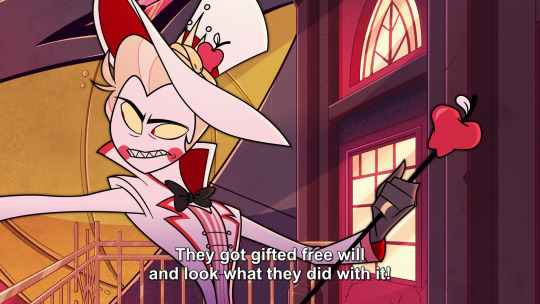
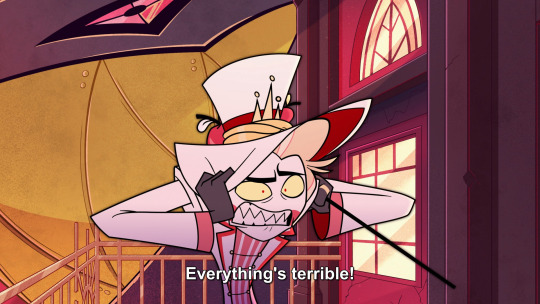
Based on the introduction to Episode 1, Charlie also views 'free will' as a gift (Miltonian), whereas Lucifer appears to view it as a curse.

However, Charlie also notes that it was through the 'gift' of free will that the "root of all evil" entered the world, for if mankind could choose to be good, then they could also choose to be evil ('malus').
John Milton states in Paradise Lost: "Of Man's First Disobedience, and the Fruit Of that Forbidden Tree [malus], whose mortal taste Brought Death (evil, malus) into the World, and all our woe."
Thus, the use of an apple specifically is likely a tie-in to what others have been speculating about a character that series creator Vivienne Medrano (Vivziepop) alluded to a while back: "The Root of All Evil".
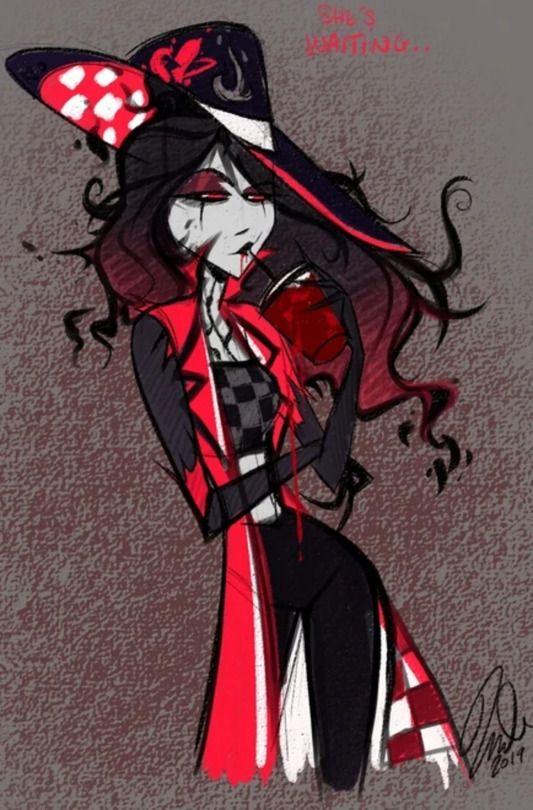
However, "Roo" itself is depicted as possessing the body of a human woman, presumably Eve, the first one to eat the "fruit of knowledge":

Thus, we can discern that "Malus" likely refers to this character. (Also see: "Maleficent", a name that also uses the root word "mal", "evil".) As for Roo's intentions, if Charlie is "good" - and, if, in fact, Alastor was sent by "Roo" (Eve) - then they may want for Alastor to work on their behalf to "corrupt" Charlie, or make sure the hotel never succeeds.
This is because demonic power is tied to human souls, and there are "millions of souls" in Hell, which likely fuels the great power of "Roo". The more souls there are in Hell, the more powerful "Roo" becomes. The Overlords also get their demonic power from "millions of souls".

The deal between Eve and "Roo" might even be the first contract, or deal, between a human soul and a demonic entity; in exchange for 'free will', and the knowledge of good and evil, Eve allowed the "Root of All Evil" to inhabit her body, and to escape the void or prison it was confined to by Heaven (Hell?). (For one cannot be 'all-good' unless you attempt to 'eliminate' or 'ablate' evil; and, in Greek mythology, Zeus imprisoned the Titans in Tartarus for all of their evil deeds.)
Another possibility, brought up in an article by Gillian Osborne, is that Lucifer sees the "fruit of knowledge" as an apple, but it may appear as different fruits to different people, depending on how they view it. This also fits with Lucifer and angels being able to easily shapeshift.
In Paradise Lost, only Lucifer describes the fruit as an "apple" (malus), as he associates malus with "bad, evil", while the narrator also describes the fruit as "a mix of different colors" and peach-like. This then begs the question: "Did the fruit of knowledge of good and evil become 'evil' because Eve harbored resentment towards Adam?"
Quote: "Lucifer (Satan) gives Eve yet another hint that this tree may be more complicated than he wishes her to believe: although elsewhere in Milton's poem Eden is heady with its own newness, sprouting spring flowers left and right, the tree of knowledge is already old: its trunk is 'mossie'. Nevertheless, Lucifer claims to wind himself around the tree 'soon'; the quickness of his reported arrival stands in contrast to the timescales required to cover a fruit tree with moss (PL 9.589). Placing Lucifer's winding body between these two timescales—an easeful present and the inhuman scale of natural history—Milton suggests that there is something dangerous in entangling the past with the present. Yet, 'Paradise Lost' also makes deep biblical history feel like present politics for its readers. When Adam and Eve wander out of Eden at the end of the poem, they famously make their way not only into an earthly paradise, but also into the present. Eden's mossy apple tree therefore represents the pitfalls of conflating nature and history, of seeing any action in human history—even Eve's eating of an apple—as natural, if by nature, we mean inevitability. For Milton, history, unlike nature, is directed by humans, progressive, and, like the reading of 'Paradise Lost', hard work. While trees may inevitably collect moss the longer they live, Adam and Eve's labors in the garden, and our labors of reading, require agency and effort. Milton's poem refuses mourning the loss of Eden, [and the perfection of Heaven], in favor of a perpetual, melancholic, recreation of paradise: a present perfecting."
To quote Twisted: The Untold Story of a Royal Vizier, which also draws inspiration from John Milton's Paradise Lost: "It's an unfortunate situation...but you do have a choice [i.e. free will]."
#hazbin hotel#hazbin hotel analysis#hazbin#hazbin analysis#hazbin hotel meta#hazbin meta#hazbin hotel theory#hazbin theory#deep thoughts#john milton#paradise lost#eve hazbin hotel#lucifer hazbin hotel#lucifer morningstar#adam hazbin hotel#lilith hazbin hotel#lilith morningstar#roo hazbin hotel#root of all evil
256 notes
·
View notes
Text
The multi-billion euro pornography industry must be “targeted” to end a culture of violence, degradation and increasing misogyny in Ireland, a report has warned.
Women’s Aid, which commissioned the report, is urging the Government to address “consistently high” levels of sexual abuse linked to porn in Ireland.
The research found that porn featuring verbal degradation and extreme acts such as choking was now mainstream and freely available online.
Such consumption of sexually violent content is affecting healthy sexual development and behaviour in adults and teens.
It was also leading to sexual violence, unhealthy relationships and hostile misogyny and it compounded gender inequality, the report noted.
Ruth Breslin, the director of The Sexual Exploitation Research and Policy (SERP) institute, was co-author of the report alongside Dr Monica O’Connor.
Ms Breslin said progress on sexual “consent” was “being undermined by boys’ sexual expectations of girls”, which was “moulded by pornography”.
“Girls have been groomed by pornography to submit to acts that they do not want and do not enjoy,” she said.
“In shaping boys’ sexual scripts, pornography has taught boys that women, and therefore girls, have limitless sexual appetites, a high tolerance for pain, sometimes say ‘no’ when they mean ‘yes’ and enjoy ‘aggressive sex’, which includes physical violence, sexual assault and verbal abuse.”
Most (81pc) of the 18 to 25-year-olds surveyed as part of the research said pornography was increasing young men’s interest in seeking rough or violent sex. Three-quarters agreed that pornography made children and young people vulnerable to requests to share intimate images and videos.
Further, 71pc said the Government and technology companies needed to do more to protect children and young people from pornography exposure and should act faster to support survivors of image-based sexual abuse.
In the poll, 81pc of all respondents said they wanted age-appropriate sexuality and relationships education in schools, with a focus on the negative consequences of being exposed to porn.
Sarah Benson, CEO of Women’s Aid, said: “This study now clearly confirms that the vast majority of pornography does nothing to promote healthy sexuality, equality and intimacy, but is instead creating a conducive context for violence and degradation, particularly of women and girls.
“This is directly relevant to our work, as women contacting Women’s Aid for support have identified their partner’s use of pornography as a component of the sexual coercion and abuse they’re enduring.”
The study, called Facing Reality: Addressing The Role Of Pornography In The Pandemic Of Violence Against Women And Girls, underscores the damage porn is also doing to victims of sex trafficking, including children and ordinary Irish women and girls.
In its research, Women’s Aid urges the Government to “tackle an unregulated multi-billion euro pornography industry”.
It said it was vital to examine practical and effective measures to “target the business model of a wholly unregulated international industry with an appalling track record of exploiting vulnerable people, including children, for profit”.
“There have been successes in other jurisdictions, such as the US, with class action suits on behalf of trafficking victims and successful appeals to financial institutions, providing vital infrastructure to the pornography industry,” the report said.
“The potential to build on or leverage these actions to reduce the impact of the industry in the Irish context should be considered.”
Women’s Aid said it was encouraging that porn was challenged in the Government’s third national strategy to prevent and combat domestic, sexual and gender-based violence.
However, Ms Benson said explicit images could still be shared without consent by partners or former ones and even used for blackmail and coercion.
This could affect a “survivor’s well-being, mental health, employment and social connections”, the report found.
Although the Harassment, Harmful Communications and Related Offences Act 2020 had “created much needed offences in relation to image-based sexual abuse”, the charity said prosecutions took time. Yet images were “available and can be shared and re-posted”.
There was “an opportunity to protect children and adults alike with the current Online Safety and Media Regulation Bill”, the report said.
“The proposed Online Safety Commissioner must be provided with the power to issue immediate take-down orders in cases of image-based sexual abuse specifically,” it said.
Studies on men’s attitudes and behaviours have found a strong link between the consumption of violent pornography and attitudes supporting violence against women and misogyny.
The report was funded by Community Foundation Ireland.
(archive)
64 notes
·
View notes
Text
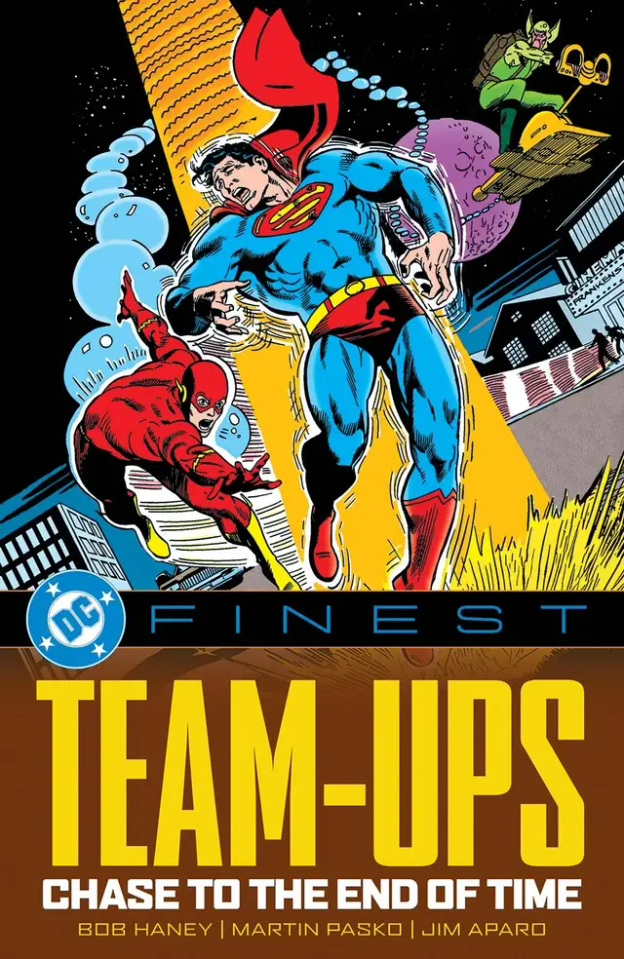
DC Finest: Team-Ups - Chase to the End of Time by Bob Haney, Jim Aparo, Martin Pasko, Jerry Serpe, Len Wein and others. Cover by José Luis García-López and Dan Adkins. Out in March 2025.
"The Man of Steel and the Flash! The Caped Crusader and Black Canary! See the World’s Finest duo of Superman and Batman join forces with other DC superheroes in DC Finest: Team-Ups: Chase to the End of Time, collecting some of the most exciting team-up stories from the Bronze Age of comics from May 1978 to October 1979. Featuring the works of some of the greatest artists and writers in comics, this volume contains stories from DC Comics Presents #1-14 and The Brave and the Bold #141-155."
#dc finest#dc finest: team-ups#chase to the end of time#dc comics presents#superman#the brave and the bold#batman#dc comics#bob haney#jim aparo#martin pasko#jerry serpe#len wein#josé luis garcía-lópez#jose luis garcia lopez#dan adkins#trade paperback#collected edition#books#comics
9 notes
·
View notes
Text
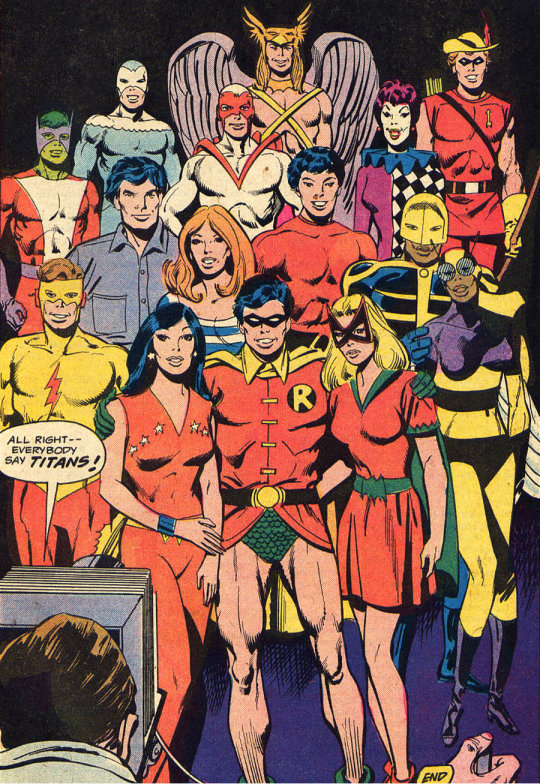
Teen Titans East (Robin, Wonder Girl, Kid Flash, Aqualad, Bumblebee, Guardian, Speedy, and Harlequin) and Teen Titans West (Bat-Girl, Lilith, Gnarkk, Beast Boy, Hawk, Dove, and Golden Eagle) pose for a commemorative photograph in Teen Titans (vol. 1) #52 (December, 1977). Art by Don Heck and Bob Smith; colors by Jerry Serpe; letters by Milt Snappin.
This was the penultimate issue of the series, the cancellation of which had already been announced. The following issue would be the last, featuring Bumblebee and Guardian looking through a casebook to learn the untold tale of the formation of the team. When Bumblebee and Guardian finish the other members arrive to announce that the Teen Titans are being disbanded so the members can purse their own solo careers.
That didn't last long, though, as the team would be back in 1980 under new management - Marvel Wolfman and George Perez - as the New Teen Titans.
#Teen Titans#Titans East#Titans#West#Wonder Girl#Robin#Bat-Girl#Kid Flash#Guardian#Bumblebee#Gnarkk#Lilith#Aqualad#Beast Boy#Hawk#Harlequin#Dove#Golden Eagle#Speedy#DC Comics#Don Heck#Bob Smith#Jerry Serpe#Milt Snappin
31 notes
·
View notes
Text
Why Research is the Foundation of SEO Success

SEO without research is like navigating without a map — you might move, but will you reach your destination?
Here’s why deep research is critical for dominating search rankings:
🚀 Search Intent Mastery — It’s not just about keywords; it’s about understanding why users search. Align content with their needs to drive conversions.
📊 SERP & Competitor Intelligence — Google’s algorithm evolves, and so should you. Analyze SERP features, E-E-A-T signals, and backlink profiles to outperform competitors.
🔍 Advanced Keyword Mapping — Move beyond basic keyword stuffing. Utilize semantic SEO, TF-IDF analysis, and topical authority to structure high-ranking content.
📈 Data-Driven Content Strategy — Leverage Google Search Console, GA4, and NLP insights to craft content that ranks and retains users.
⚙️ Technical SEO Research — Crawling, indexing, Core Web Vitals, schema markup — optimize every aspect for search engines and users alike.
SEO isn’t guesswork; it’s a science backed by research. Refine, adapt, and dominate.
#SEO #AdvancedSEO #DigitalMarketing #SearchIntent #TechnicalSEO #ContentStrategy
#seo services#on page seo#call of duty#disco elysium#obey me#ffxiv#genshin impact#fnaf#deltarune#ace attorney
2 notes
·
View notes
Text
SEO vs. PPC: Which Digital Marketing Strategy Is Better?
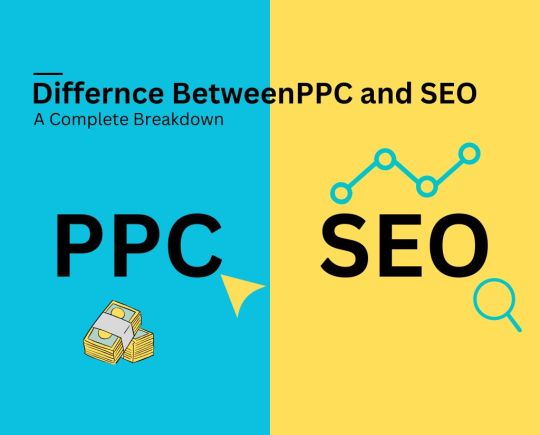
In the digital marketing world, businesses constantly choose between two primary strategies: Search Engine Optimization (SEO) and Pay-Per-Click Advertising (PPC). Both have their unique advantages, challenges, and best-use scenarios. Exploring the distinct features of each option can help you make a sound decision for your business.
Understanding SEO
SEO is a long-term strategy focused on improving your website’s visibility in organic (non-paid) search engine results. By optimizing content, improving website structure, and earning backlinks, businesses aim to rank higher on search engine results pages (SERPs).
Advantages of SEO
Cost-Effective in the Long Run: Unlike PPC, SEO doesn’t require direct payment for each click.
Sustainable Results: Once you achieve high rankings, maintaining them can drive consistent organic traffic.
Enhanced Credibility: Users often trust organic results more than paid ads.
Broad Reach: SEO can help you rank for multiple keywords, reaching a diverse audience.
Challenges of SEO
Time-Consuming: Achieving top rankings often takes months.
Algorithm Changes: Search engines frequently update their algorithms, requiring ongoing adjustments.
Highly Competitive: Popular keywords can be difficult to rank for without significant effort and expertise.
Understanding PPC
PPC advertising involves paying for ads that appear at the top of search engine results or on other platforms like social media. Businesses are charged each time someone clicks on their ad, making it a more immediate but transactional approach.
Advantages of PPC
Immediate Results: Ads start driving traffic as soon as they’re live.
Refined Targeting Options: PPC advertising lets you tailor your strategy to specific groups, areas, and time periods.
Data-Driven Insights: You can track metrics like click-through rates (CTR) and conversions in real-time.
Scalable Campaigns: You control your budget and can adjust campaigns for better performance.
Challenges of PPC
Costs Add Up Quickly: High competition for keywords can drive up costs.
Short-Term Benefits: Once you stop paying, traffic stops.
Ad Fatigue: Users may ignore ads over time if they feel bombarded.
Comparing SEO and PPC
Cost
SEO: Requires upfront investment in tools, content, and expertise but offers sustained traffic over time.
PPC: Involves direct payments for clicks, with costs varying based on keyword competition.
Time to Results
SEO: Ideal for long-term growth; it takes time to build rankings and authority.
PPC: Provides immediate visibility and traffic.
Audience Trust
SEO: Builds credibility by appearing organically.
PPC: Can generate skepticism among users who prefer organic results.
Flexibility
SEO: Less flexible; changes take time to show results.
PPC: Extremely flexible, allowing for rapid adjustments.
Which Strategy Is Right for Your Business?
Choosing between SEO and PPC requires careful consideration of your business aims, budget, and the time available to achieve your goals.
Choose SEO if: You aim for long-term growth, have the patience to wait for results, and want to establish credibility in your niche.
Choose PPC if: You need immediate results, have a flexible budget, and want precise control over targeting.
Why Not Both?
Combining SEO and PPC can often yield the best results. While SEO builds a sustainable foundation, PPC can drive quick traffic and support time-sensitive campaigns. For example, you could use PPC to promote a new product launch while optimizing your website for organic traffic over time.
Conclusion
SEO and PPC are powerful digital marketing strategies, each with unique benefits and limitations. Instead of viewing them as competitors, consider how they can complement each other. By strategically leveraging both, you can maximize your online visibility, reach your target audience, and achieve your business goals effectively.
#digital marketing#digital marketing agency#top digital marketing companies#digital marketing services#best seo services#ppc services#seo services#twillion solutions
2 notes
·
View notes